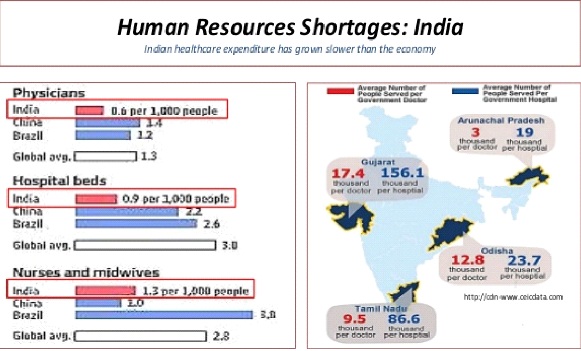National Medical Commission Bill : Important Topics For UPSC Exam

National Medical Commission Bill
Recently introduced National Medical Commission (NMC) Bill is important in the respect that it try to make improvement in medical education system in India. Currently medical colleges in India, on one hand are not sufficient and on the other hand are suffering from rampant corruption. The Government recognize that the problem lies in the malfunctioning of the highest body, that is, Medical Council of India (MCI).
Tackle the problem of insufficient Medical colleges
- The Medical colleges in India are not adequate in providing sufficient doctors that our country needed. India has only one doctor for 1700 people. It is a matter of grave concern as World Health Organization (WHO) set the ratio of 1: 1000 for doctor and population. The diagram shows the glimmering picture of shortage of medical practitioners in India.

The new NMC bill tries to solve this problem by easing the norms of opening private colleges in India.
Fight with corruption--
The problem of Politicization and partisanship in MCI is the biggest hurdle in reforming healthcare system in India. Ketan Desai case shocked the whole nation and the need for reform felt in every nook and corner. The NMC bill tries to solve this issue by removing the absolute powered body. It distributes power among four autonomous bodies—those for
- Undergraduate education like MBBS
- Post graduate education like MD
- Medical education and colleges assessment and rating
- Ethics and registration
The new commission will also take care of patient rights by including patient rights advocates and ethicists. This new setup is line with global best practices like the medical regulators in UK, Australia and Canada.
Issues--
- The bill, no doubt, is a good step in right direction. However, there remains certain major problems on which it is silent.
- First of all, the bill does not specifically talk about rural healthcare needs. As our country is already facing the problem of less number of medical practitioners, the rural urban divide in healthcare facilities make the situation even worse. Most of the Indian doctors are in Urban India, while nearly 70% population of India live in rural areas. Therefore, easing the opening of private medical colleges in India is a half work done.
- Secondly, the selection process of members in the new committee is still not clear. Arvind Pangaria sir of NITI Ayog has rejected the idea of including election for the selection as it enhances the politicization. Therefore, the new and innovative way of selecting the members in regulator is the need of hour.
Way Forward--
The following things need to be done specifically in this regard--
- The pragmatic idea of including the quacks by giving them short term basic medical trainings should be explored. These quacks can solve the problems of healthcare inclusion in rural and marginal areas of India. This idea has already been tried and tested in many sub-Saharan countries.
- International organizations like Medecins Sans Frantiers and Red cross have also endorsed training programs for these non-doctors to carry out urgent and critical surgical procedures like caesarian.
- The selection of members in the regulator should be done by elections but with limited terms of office. NMC should work like an independent body like Election Commission and UPSC.
Questions :
Q. Recently Government introduced the National Medical Commission (NMC) Bill. Which of the following are true about this bill--
i. This bill seeks to centralize the medical sector in India by taking all
the powers from the states as there would be no state councils.
ii. The NMC will have 20 members including chairperson.
(a) Only i is true
(b) Only ii is true
(c) Both i and ii are true
(d) None
Answer-- None. As there would be state council three years after the commencement of the bill. And the NMC will have 25 members. (No problem in tackling this Mcq if follow the hindu regularly. If not then please refer PRSindia website for bills.)
Q. Indian healthcare sector is facing the double challenge in providing both quantity and quality of healthcare services. The newly introduced National Medical Commission bill is capable in tackling these challanges. Elaborate.
(Write by yourself)-- Few things need to be consider while writing
Introduction-- The answer can be started by putting some facts like doctor-patient ratio, IMR, MMR in India. These facts help you to convince the examiners that you know the grim situation of health in India.
Or, if you do not remember the exact data, you can simply play with words and show that India is a tropical country so it is a home of many deadly tropical diseases like Malaria or something like that. Then talk about Sustainable Development goals where healthcare services along with education is being given priority.
Or, you may think innovatively by yourself. Just take care of that you should convince the examiner by your intro. that you understand the question.
Body-- In body, talk about the old body MCI that is mandated to regualate the colleges and entrance examination. However, with the passage of time, this body become obsolete and issues like politicization, partisanship emerged. The nation can not bear the burden of bad functioning of highest healthcare body. Therefore NMC bill is being introduced.
Now show some points over which the bill talks about as I have already mentioned in my article. Try to limit yourself in two or three points.
Conclusion-- Now, End with the conclusion same as I do in my article.

